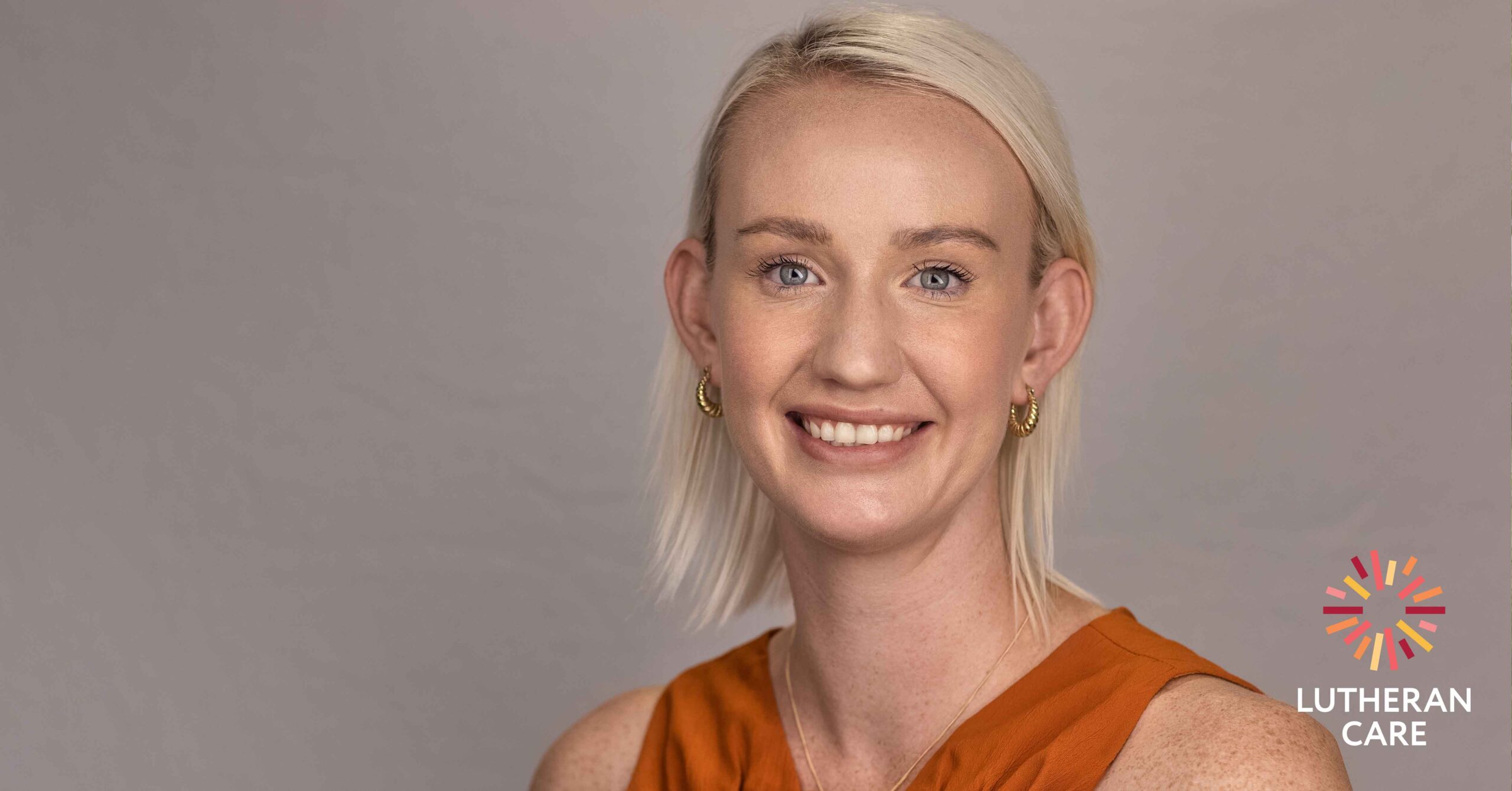Upon meeting Tamsin Petzer, the energy and enthusiasm she exudes in all directions are enough to a) make you want to sit down and have a rest on her behalf, or b) follow her lead and throw yourself wholeheartedly into whatever you’re passionate about. Fortunately for Lutheran Care and the staff she leads, Option B is highly popular.
Tamsin is the Principal Clinical Lead for Lutheran Care’s NDIS service, Elcies Disability Care, and one of the Lutheran Care women we are shining a light on for International Women’s Day.
The highly articulate professional grew up in South Africa. There, Tamsin didn’t often come across people with disabilities.
“It’s different in South Africa for people with disability. Many are not fully included or supported to engage in the community and often reside in institutions or are restricted to the family home,” Tamsin explains.
It wasn’t until she moved to Australia with her family at age eight, that she began to see what inclusion could look like. Although in South Africa she’d had an extended family member with Down Syndrome whom she connected well with, unfortunately they didn’t catch up all that often. In Australia, she remembers being intrigued and excited to have a classmate with an intellectual disability in her mainstream school.
“Whilst we can still do better, I saw more people who did things differently and were being included in the community,” she says.
Tamsin always felt drawn to helping people. Through church, she volunteered with elderly people and alongside her mother, supported young children at Sunday School.
Unsurprisingly, Tamsin was inspired to follow a career path in care. This led her to complete a Bachelor of Education with a major in Special Education R-7, with a Bachelor of Disability Studies double degree.
After a few years as a teacher, Tamsin wanted a change whilst continuing to support young people, and went into Developmental Education, which is an allied health profession. She undertook a Graduate Certificate in Positive Behaviour Support, specialising in Autism.
She was employed with Autism SA’s Early Intervention, Foundation Skills Group, as part of a transdisciplinary team of health professionals supporting a small group of children and their families with their unique needs. Her role as a team leader there was a good fit, however Tamsin wanted again to broaden her scope of practice and engage as a Behaviour Support Practitioner to help people with disabilities across their lifespan.
This brought her to Lutheran Care’s as a key member of the team helping to roll out the flagship Positive Behaviour Support (PBS) program as part of Elcies Disability Care service.
With highly experienced leadership guiding the new service provision into Lutheran Care’s service offerings, the PBS program, client list and team grew.
PBS is a service that aims to help clients to enjoy greater access to community spaces and community life and ultimately improve quality of life, by removing barriers they may be experiencing such as Behaviours of Concern.
Behaviours of Concern may challenge the safety and comfort of the person as well as their carers or family members, and others around them. Behaviours may be physical (eg. hitting or kicking), verbal (shouting or swearing), or other actions such as damaging property, stealing, or running away. Which can impact safety, capacity or comfort levels attending school or the shopping centre; catch a bus or other daily activities.
Understandably, this can be an extremely challenging and stressful situation for the client and their family. However, Tamsin is of the firm belief that the human right to communicate and be understood is at the root of all behaviours, and like a TV detective, she loves the challenge of trying to translate the meaning behind what each client is trying to say. The ‘cure’ isn’t changing the person – it’s figuring out what they need and responding to their request, helping them develop skills, adding extra supports or tools, or changing the environment around them, to better support the person.
“There’s always a communication function. They’re trying to say something,” Tamsin says.
One client she assisted was in distress and yelling at certain times. Tamsin identified this would happen around the time the person needed to take medication. She noted the behaviours were heightened when the person administering the medication was unfamiliar to the client, signalling they were feeling unsafe or uncomfortable. She suggested the team experiment with administering the medication at a more favourable time for the client, and ensuring enough notice was given. Changing up the situation made a real difference to this person and their family.
Tamsin admits it’s rewarding when you can get to the bottom of interpret what a client is communicating.
“It’s quite liberating, to see success for the person – it opens up so many doors for them.” she says.
“They have so much more to their life – there’s a ripple effect that happens to their team, too.”
As the Principal Clinical Lead, Tamsin no longer handles an active caseload, however is involved in supporting the team with guidance and strategies to provide best outcomes for clients and their support teams.
Tamsin points out how important working with her team to build a strong collaborative team is to the success of the business, wellbeing of the practitioners and the entrenched culture of the service.
“We problem-solve and share our successes together,” Tamsin says.
Reflecting on International Women’s Day and the United Nations theme, Invest in Women: Accelerate Progress, Tamsin notes that both teaching and allied health are female dominated fields, however, many of the leadership roles tend to go to men.
However, Tamsin feels fortunate to have grown up around and worked with many strong role models, and have had some excellent mentors who are women, namely Lutheran Care colleagues Bianca Dubois and Katrina Ranford and her maternal Grandmother who was an influential and respected leader in business well ahead of her time.
“What ‘I’ve been guided by, is to advocate for what is right and ensure that your work aligns with your values. And if you work with integrity and compassion, do not accept anything less than to be valued for the work you produce,” she says.
Tamsin continues to advocate and provide a hand up for other women to go into leadership roles, with aspirations to always be, “professional, supportive and real”.
“I’m hoping I can pass on this guidance and my experience to women (and men) in all roles and professions. You can be a leader and not be in an official leadership position”.
Despite Tamsin’s experience and qualifications, she recalls experiencing some casual sexism in her professional life, with the male stakeholder ignoring her suggestions and granting his full attention and respect to one of Tamsin’s male staff members.
However, one thing Tamsin is not, is shy, and she feels fortunate to have the confidence to call things like this out. In this situation, she very clearly but respectfully pointed out to this person she knew what she was talking about, and it would be in the stakeholder’s interest to listen. He did.
The gusto she brings to her working life is the same she brings to the court or the running track, as an accomplished sportsperson, representing state and national junior teams for netball and rowing and recently retiring from playing Premier League netball.
Tamsin now spends her time running long distance, as much as for fitness but more so to nourish her mental wellbeing. Having competed in a number of half marathons, Tamsin is currently training for another marathon in August, to raise money for ovarian cancer research in honour of her Aunty, who has terminal ovarian cancer. They are very close. “We were born on the same day,” Tamsin shares.
Lifting others up seems to be a theme across Tamsin’s life.
Doing some online research for this article uncovered a Q&A with Tamsin from an old netball club, and this advice she gave then to younger players still seems relevant;
“Keep striving to achieve your goals, push and work hard, no matter what happens in your journey; set backs are a way of building resilience for future success.”

